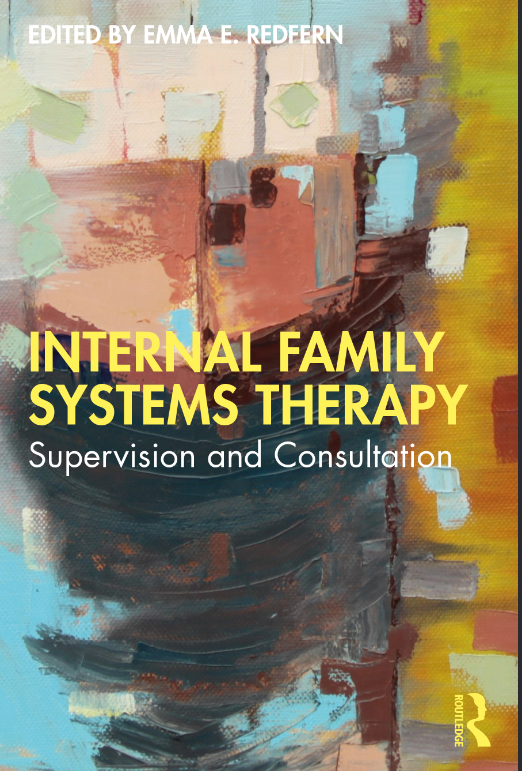In Internal Family Systems (IFS), therapy for me is therapy for you too. As you help me welcome my Self, who will soothe my protectors and heal my exiles, you do the same for your protectors and exiles. If you are my therapist and one of your protectors reacts to one of my parts, you have the opportunity to find your exile and heal it. If you are my supervisee, we both have the opportunity – with the help of many clients in absentia since we therapists are always drawing on what we learn from clients – to notice our protectors and find our exiles. If you supervise a group of therapists, everyone has the opportunity to notice their protectors and find their exiles – with the help of many clients in absentia – when one participant speaks. This is true because systems (the psyche, dyads, groups) nest and mirror each other, which means the IFS treatment process can be applied to systems at all levels. As the authors of this book emphasize and illustrate with case examples, IFS therapy and supervision are multisystem inquiries. Emma E. Redfern, this volume’s editor, interviews Richard C. Schwartz on his philosophy of supervision. His approach includes helping therapists to view clients as tor-mentors, who are skilled at detecting the therapist’s parts, and to apologize if the therapist’s parts intrude on therapy. He talks about the importance of not fearing clients’ extreme parts, not being afraid of getting it wrong (“Just ask.”), and knowing how to defuse suicide parts (which he describes). Although Schwartz will cover technique when supervising, he declares himself a minimalist whose overarching goal is to empower therapists to trust their Self.
چکیده فارسی
در سیستمهای خانواده داخلی (IFS)، درمان برای من برای شما نیز درمان است. همانطور که به من کمک میکنی به خود من خوش آمد بگویم، که محافظان من را تسکین میدهد و تبعیدیان من را شفا میدهد، همین کار را برای محافظان و تبعیدیان خود انجام میدهی. اگر شما درمانگر من هستید و یکی از محافظان شما به یکی از قسمت های من واکنش نشان می دهد، این فرصت را دارید که تبعید خود را بیابید و آن را شفا دهید. اگر شما سرپرست من هستید، هر دوی ما این فرصت را داریم - با کمک بسیاری از مراجعان غیابی، زیرا ما درمانگران همیشه از آنچه از مراجع یاد می گیریم استفاده می کنیم - به محافظان خود توجه کنیم و تبعیدیان خود را پیدا کنیم. اگر بر گروهی از درمانگران نظارت داشته باشید، همه این فرصت را دارند که به محافظان خود توجه کنند و تبعیدیان خود را - با کمک بسیاری از مراجعان به صورت غیابی - در هنگام صحبت یکی از شرکت کنندگان پیدا کنند. این درست است زیرا سیستمها (روان، زوجها، گروهها) همدیگر را منعکس میکنند و همدیگر را منعکس میکنند، به این معنی که فرآیند درمان IFS را میتوان برای سیستمها در همه سطوح اعمال کرد. همانطور که نویسندگان این کتاب تاکید میکنند و با مثالهای موردی نشان میدهند، درمان و نظارت IFS پرسشهای چند سیستمی هستند. اما ای. ردفرن، ویراستار این جلد، با ریچارد سی. شوارتز درباره فلسفه نظارت او مصاحبه می کند. رویکرد او شامل کمک به درمانگران است تا مراجع را بهعنوان شکنجهگرانی ببینند که در تشخیص اجزای درمانگر مهارت دارند و اگر بخشهای درمانگر در درمان دخالت کرد، عذرخواهی کنند. او در مورد اهمیت نترسیدن از قسمتهای شدید مشتریان، نترسیدن از اشتباه کردن («فقط بپرس») و دانستن چگونگی خنثی کردن بخشهای خودکشی (که او توضیح میدهد) صحبت میکند. اگرچه شوارتز هنگام نظارت، تکنیک را پوشش می دهد، اما خود را یک مینیمالیست معرفی می کند که هدف اصلی آن توانمندسازی درمانگران برای اعتماد به خود است.
ادامه ...
بستن ...
Author(s): Emma E. Redfern
Publisher: Routledge, Year: 2022
ادامه ...
بستن ...










